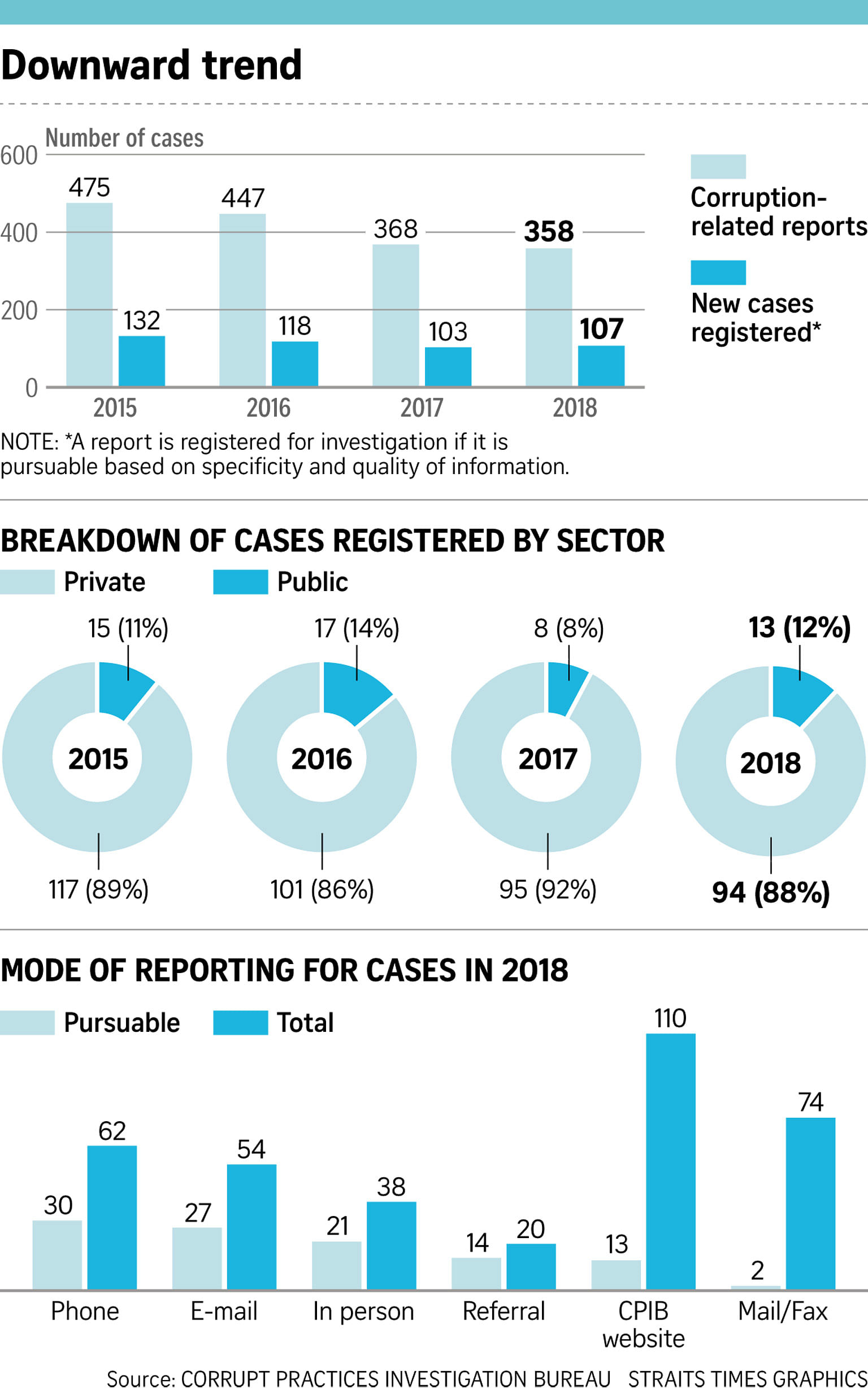The corruption situation in Singapore remains firmly under control, said the Corrupt Practices Investigation Bureau (CPIB) in a release of its 2018 statistics yesterday.
Last year, the bureau received 358 corruption-related reports, and 107 of these were registered for investigation, which means there was sufficient evidence for the CPIB to investigate.
The figures are similar to 2017, when there were 368 corruption-related reports, 103 of which were registered for investigation.
Overall, the number of reports and cases registered for investigation has been on a downward trend since 2015, when there were 475 such reports, with 132 cases registered for investigation.
A report is registered for investigation if it is deemed able to be pursued based on the specificity and quality of information provided. Reports that cannot be pursued are vague or unsubstantiated and do not provide sufficient leads to initiate an investigation.
"The CPIB takes a serious view of all reports and information that may disclose any offence under the Prevention of Corruption Act. They are thoroughly deliberated regardless of the nature of amount of gratification, or whether the complainant is named or anonymous," it said.
Under the law, the identity of the complainant is kept confidential.
In line with previous years, the majority of the corruption cases registered came from the private sector, with 88 per cent or 94 registered cases where individuals accepted, gave or offered bribes.
Of these, about 15 per cent involved public-sector employees rejecting bribes offered by those in the private sector, which could include areas such as the building and construction, food and beverage, and warehouse sectors.
Of the total number of registered cases last year, the proportion of public-sector cases remained low, said CPIB. Cases where public-sector employees accepted, gave or offered bribes made up 12 per cent of the total figure, with 13 cases.
Last year, a total of 112 people were prosecuted for offences investigated by the CPIB. Of the figure, 107 were from the private sector, with about 20 offenders from the construction sector. The CPIB also highlighted the construction and building maintenance work sectors as areas of concern.
Last year, the CPIB completed investigations into 80 per cent of the individuals investigated. This figure has averaged at 81 per cent over the past five years. The annual conviction rate also averaged about 98 per cent over the same period.
Members of the public can report suspected acts of corruption to the CPIB through various channels, such as over the phone, e-mail or in person. Last year, the CPIB received 62 reports via phone calls, 54 reports via e-mail and 74 reports via mail or fax. The highest number of reports came through its website - 110 reports, with 13 of these cases registered for investigation. There were 20 cases referred from other agencies to the CPIB that resulted in 14 cases registered for investigation.
Last year, 38 reports were made in person, where 21 cases or more than 55 per cent were registered for investigation, said the CPIB. Reports made in person are one of the most effective forms as the bureau is able to get more detailed information from the complainant, it said.
It added that overall, Singapore remains one of the world's least corrupt countries. The Republic ranked third, alongside Finland, Sweden and Switzerland, in the 2018 Transparency International Corruption Perceptions Index. Denmark came in first and New Zealand second.
Two cases where jail terms were meted out
Over the course of seven years, a technical officer with the national water agency PUB duped his employer into approving purchase orders worth almost $2 million to companies he controlled.
Besides obtaining a confession from Mohamed Sa'ad Mohamed Ali, Corrupt Practices Investigation Bureau (CPIB) officers also trawled through the 700 transactions involved in the case.
It was reported that Mohamed Sa'ad had cheated the agency into awarding 718 contracts to three companies under his wife's name from 2005 to 2012, when his crimes came to light.
Through the use of forensic accounting to identify and trace the proceeds of crime, CPIB officers uncovered that Mohamed Sa'ad had used $470,000 of his ill-gotten gains to buy a sports car, an insurance policy, a gold certificate, a factory unit and to make repayment for a Housing Board mortgage loan.
In November last year, he was sentenced to 45 months' jail for cheating and money laundering.
The assets he had amassed were also seized, liquidated and returned to the PUB, said the CPIB in highlighting cases it had dealt with during its annual statistics release yesterday.
"These cases illustrate the importance of investing in our people to sharpen their skills particularly in the areas of interview, financial investigation and digital forensics," CPIB said.
In another case that concluded last year, a contractor and his subcontractor were jailed for giving an employee of a hotel establishment $300,000 as a reward for furthering their business interests in construction works at the hotel.
Intelligence work, computer forensics and the tenacity of its officers were instrumental in this case, said the bureau, adding that investigations started after it received an anonymous tip-off.
Tan Ken Huat, managing director of Shanghai Chong Kee Furniture and Construction, was sentenced to nine months' jail last August, while Teo Wee Liap, director of Superiortec, a subcontractor for Tan's company, was jailed for six months in June. The hotel employee, Soh Yew Meng, director of the building enhancement department, was jailed for 14 months in 2017.
Tan Tam Mei


